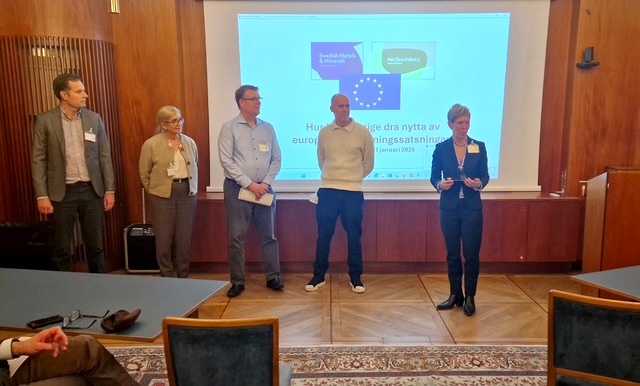Great opportunities for funding in EU projects
Within the EU, there are a variety of opportunities to receive support in the funding of research, education and innovation. But in Sweden, we can be better at taking advantage of the funds available. That is why an ‘EU Info Day’ was organised on 21 January.
The EU includes a large number of funding tools for research, education and innovation with the possibility of a variety of projects in most areas. In addition, there are also various platforms for dialogue with the European Commission on R&I issues.

In Sweden, we are ‘average’ at applying for funding and participating in EU projects compared to other countries in the Union. However, there are major variations between different forms of funding. For example, Sweden is very successful in the field of materials, where strong companies and researchers are involved, while we participate to a lesser extent in the field of production.
But which partnership programmes are central to funding in the production and materials areas? Is there funding for research and innovation outside Horizon Europe? And what experiences do Swedish companies and researchers have in participating in EU-funded projects? These were some of the questions discussed at the first EU Info Day. The aim of the day was to encourage more Swedish actors to both apply for funding and participate in EU projects, but also to strengthen networks and collaborations between Swedish and European companies and research organisations.
EU Info Day was organised by Net Zero Industry and our sister programme within Impact Innovation, Swedish Metals and Minerals. There was a great deal of interest and more than 80 people travelled to Jernkontoret’s premises in Stockholm – from LKAB in the north to Höganäs in the south. It was particularly pleasing that several smaller companies and start-ups participated. In addition to companies in the industry, universities, research institutes, research funders and authorities also participated.
During the day, participants heard from experts in Cluster 4 partnership programmes such as Process4Planet, Made in Europe and Clean Steel, and funding for innovation from the European Innovation Fund. There were also experiences of KICs and partnership programmes from researchers and companies such as Epiroc, SSAB, Stilfold and Chaintraced. Their message was clear. Although it is a lot of work, collaborating and exploring with many European actors gives a lot back and it is clearly worth it. Participating in EU-funded research and innovation programmes is a clear win-win.
– There is a high threshold for venturing out into Europe, but if we are to achieve net zero in Swedish industry and develop a sustainable materials industry, international collaboration is needed. The response from the participants was very positive and we hope to hold a similar event next year, says Cecilia Warrol, Coordinator for Internationalisation within Net Zero Industry.